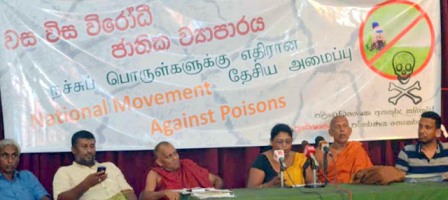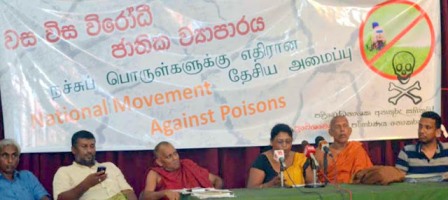Sri Lanka: Implement the Glyphosate Herbicide ban immediately! – National Movement Against Poisons


La Via Campesina South Asia
(Sri Lanka, June 14, 2015) The National Movement Against Poisons (NMAP) demanded the government of Sri Lanka to immediately implement the ban on Glyphosate, at a news conference held today at Center for Society and Religious. NMAP is a coalition that includes MONLAR, an LVC member.
The co-convener of the movement, Ven. Mahamankadawala Piyarathane Nayaka thero raised concerns over the implementation of the decision of the president Mithreepala Sirisena to immediately ban the importation and use of Glyphosate chemical weedicide island wide as there are concrete evidences of the chemical still available in the market behind the scene. He also stresses out that the powerful agribusiness mafia is trying to overturn the decisions of the president that was taken for the sake of farmers, consumers and future generations of the country that has been already affected with various unknown diseases including chronic kidney disease epidemic. “Number of scientists who had been paid by the agro-business giants who make billions of annual profits by selling poisons and risking the life of all living forms are trying to mislead the masses and discredit the president’s decisions claiming that the decision had been taken over on the popular myths but not on the scientific bases. They are also trying to develop consent among the people saying that there is no direct link between Glyphosate and Kidney disease or any other disease. But there are numerous scientific evidences available throughout the world about the adverse effects of Glyphosate on health and environment. The funniest thing is, though these scientists are trying to free the companies from the complaints by conducting various researches in favor of the companies, they never try to figure out any solution to the problem of the people.
This clearly implies the forces behind their voices”, he added. The Piyarathena thero also said that, “The companies and scientists are arguing that the ban on agrochemicals will lead to a food crisis by decreasing the harvest rapidly and therefore threaten the food security of the people. But even today, with excessive use of chemical pesticides, fertilizers and expensive machineries in agriculture, thousands of people including children are dying every day due to malnutrition and hunger. However, before the introduction of these inputs into agriculture in Sri Lanka, people were self-sufficient and had enough and diverse foods throughout the year. And there were no prevalence health problems or environment crisis. Thus that evidence is more than enough to defeat their claim and president to continue with the ban and influence ecological farming policies for the country”. The movement has planned to organize island wide poster campaign to urge the government and the president to implement the ban on Glyphosate despite the pressure from companies. And on 25th of June they have organized a rally and a public seminar on Glyphosate ban at public library of Colombo, according to Chintaka Rajapakse, a co-convener and the Moderator of Movement for Land and Agricultural Reform (MONLAR), a coalition organization of the NMAP.
Environmentalist Thilak Kariyawasa, Farmer leader M. K. Jayatissa, President of National Farmers Forum Renuka Manel also expressed their views on the issue.
